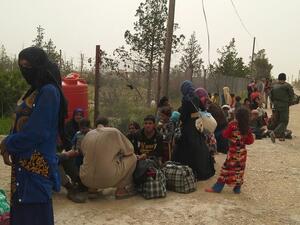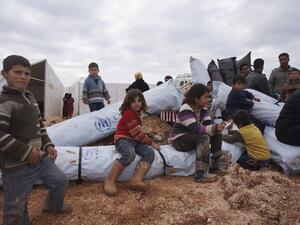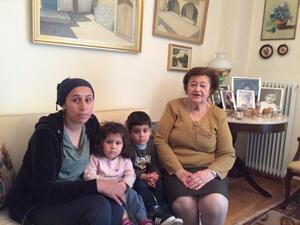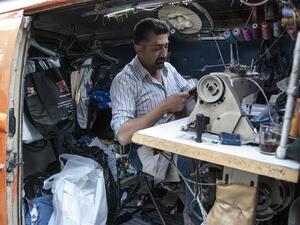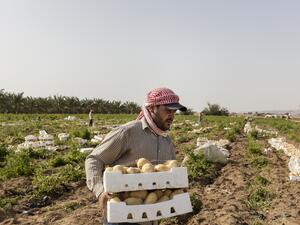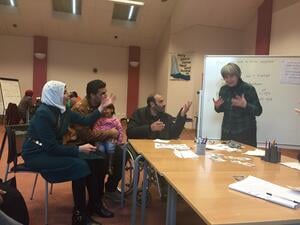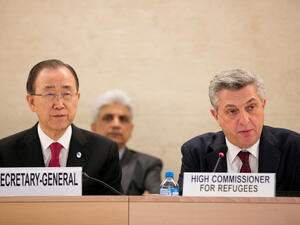Syrian exodus grows as fighting continues
Syrian exodus grows as fighting continues

Syrian refugees queue up for UNHCR relief items in Tripoli, northern Lebanon.
GENEVA, July 31 (UNHCR) - As fighting rages in Syria's largest city of Aleppo, thousands of people are huddling in fear in public buildings while thousands more flee daily into neighbouring countries that are struggling to cope with the growing influx.
There are estimates that some 200,000 people fled Aleppo and surrounding areas over the weekend. SARC and other national associations are registering about 300 displaced and desperate families every day. In the 32 schools identified, 250 to 350 people were packed inside while some 7,000 people were taking refuge in university dormitories.
Despite severe security constraints, UNHCR staff in Aleppo are liaising with SARC and other organizations to identify the needs of the most affected. From Damascus, the refugee agency is sending plastic sheets, mattresses, blankets, kitchen sets, jerry cans and diapers to SARC for distribution.
In the capital, security problems mean that UNHCR is only operating at half strength, conducting limited visits to affected areas in and around Damascus. Nine hotlines are working to take calls from the refugee population. These hotlines are an important way to gather and disseminate information on refugees' protection concerns and access to services.
"Many callers are reporting a lack of safety, fear of ongoing shelling, lack of access to food, water and sanitation, especially in areas such as Sayyeda Zainab, and families unable to leave the violent areas who are requesting help to assist in relocation," said UNHCR spokeswoman Melissa Fleming in Geneva on Tuesday. "Additionally, non-Iraqi foreigners without documents phone saying they are unable to relocate and express fears of physical harm and being targeted."
To the north, Turkey is reported to have received more than 2,000 new arrivals from Aleppo via the Hatay border in the last four days. "Many report difficulties along the route, including snipers and road blocks, which may be hindering others from making the journey," said Fleming.
Since the Syrian crisis started in March last year, more than 70,000 people have sought formal protection in Turkey. The Turkish government is helping 44,188 in eight camps across four provinces. It plans to open two more camps within the next three weeks that can accommodate 20,000 people. Additional new sites are being identified.
In Jordan, an average of 1,500 people are arriving every night through informal border crossings, mostly from Dara'a governorate in southern Syria. The Jordanian government estimates that some 150,000 Syrian refugees have arrived since March last year. On Sunday, the government opened a new camp in the north to ease the pressure on overcrowded transit camps near the border. Local communities who had been hosting many of the refugees are also running low on resources.
In Lebanon, several hundred people are arriving from Syria every day, down from a high of 11,000 in less than two days in mid-July. Recent waves have come from Damascus, Dara'a and Souwaieak, with families arriving in minivans packed with luggage. Most of the new arrivals have not yet registered with UNHCR, proceeding directly to rented apartments or hotels in Beirut or Mount Lebanon. Some said they were hoping to find work in Tripoli or South Lebanon. Others were concerned about finding accommodation. Most said they hope to return to Syria in the coming weeks.
In all, more than 34,000 displaced Syrians - 31,596 of them registered - are receiving protection and assistance through the Lebanese government, UN and non-governmental organizations. The actual number of Syrians who have fled to Lebanon is believed to be much higher.
Iraq is also seeing an increase in the number of Syrian arrivals, with 12,073 registered. In the past 10 days, more than 20,000 Iraqi refugees in Syria have also opted to return home. UNHCR is setting up transit centres at the borders with Syria to make sure new refugees and returnees get the help they need.
Some Syrians have made it further afield, with varying reports suggesting there are 10,000 to 25,000 in Algeria (where only 70 have approached UNHCR for help), as well as some 1,305 registered by UNHCR in Egypt and 400 in Morocco.
The total number of Syrian refugees registered so far stands at more than 129,240. As the exodus continues to grow, UNHCR is appealing for more support for the US$193 million Syria Regional Response Plan to help Syrian refugees in Iraq, Jordan, Lebanon and Turkey.

